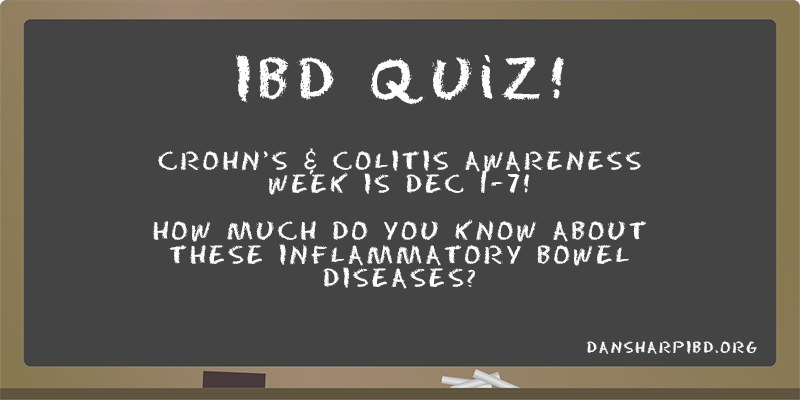
It is officially Crohn’s & Colitis Awareness Week (which runs from Dec 1-7)! The Crohn’s & Colitis Foundation of America‘s theme this year for awareness week is #IBDVisible, and they’re asking patients to “speak up, step up, and stand out all in the name of raising awareness of Crohn’s disease and ulcerative colitis!” In honor of this, I am starting a new series called IBD Quiz!
It’s important that we as patients are knowledgeable on our condition. The more we understand it, the better we can advocate for ourselves, the more involved we can be in our healthcare, the more confident we can feel about the decisions we make for our health, and the more effectively we can educate the world during Crohn’s & Colitis Awareness Week! It’s very important that the general public be sufficiently educated on what Crohn’s and ulcerative colitis are, and it is up to us to help educate them! The more informed non-patients are, the better chance we, as patients, have of gaining understanding when we need it, and the better chance we have of funding all of the great research that continues to expand our understanding of IBD and our physicians’ abilities to treat it.
I will be posting IBD-related questions throughout the week on twitter (in the form of twitters polls). Make sure to follow me there at @DanSharpIBD if you’d like to join in. Feel free to share with any friends and family who do not have IBD. Everyone’s answers will be submitted anonymously, so this is a zero pressure way for non-patients to see if they’re as well-informed as they think, and for patients to, I hope, boost their confidence in becoming #IBDVisible! I will update this page when new questions and answers are posted.
For more information on Crohn’s & Colitis Awareness Week, as well as ways to get involved, check out the Crohn’s and Colitis Foundation of America’s page here: http://www.ccfa.org/AwarenessWeek/
IBD Quiz #1: December 1, 2016
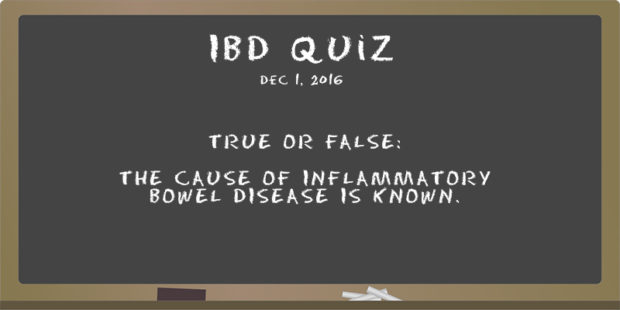
Question #1:
True of False:
The cause of Inflammatory Bowel Disease is known.
Submit your answer here: IBD Quiz #1
Time’s up!
Click here to see the correct answer to IBD Quiz #1
If you answered “False”, you are right! Scientists have come a long way in understanding IBD, but the exact cause of these diseases is still unknown. According to the University of Chicago IBD Center, “Although the exact cause of IBD is unknown, research shows that genes, an overactive immune system and environmental factors all likely play a role.”
For further information, check out this IBD School video from the University of Michigan IBD center, “IBD School 104: What Causes IBD?”
IBD Quiz #2: December 2, 2016
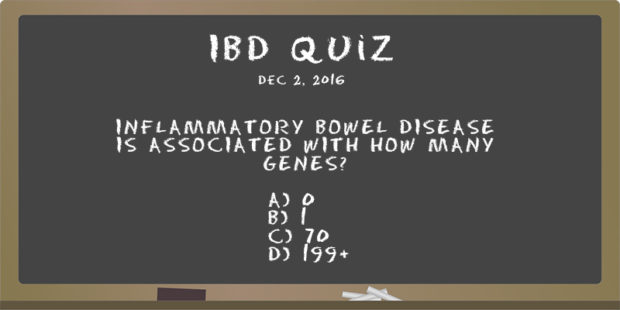
Question #2:
Inflammatory Bowel Disease is associated with how many genes?
A) 0 B) 1 C) 70 D) 199+
Submit your answer here: IBD Quiz #2
Time’s up!
Click here to see the correct answer to IBD Quiz #2
If you answered “199+”, you are right!
In 2001, a team of researchers from the University of Chicago, the University of Michigan, and other institutions, discovered the first genetic abnormality associated with Crohn’s disease. They found that a mutation in NOD2, a gene involved in the immune system’s response to bacterial infection, increased susceptibility to Crohn’s disease. We often hear nowadays that IBD is likely caused by a combination of genetic and other factors, but it wasn’t until this discovery that researchers could truly begin to understand this. When the discovery was first announced, Dr. Judy Cho from the University of Chicago stated,
“We have long suspected that both genetics and the environment played a role. This finally allows us to begin to understand how they work together to cause this disease.”
Since then, researchers have found more than 200 genetic variances associated with IBD (with at least 110 of them being associated with both Crohn’s disease and ulcerative colitis). These discoveries have led to a lot of changes in the way IBD is viewed. According to Dr. Peter Higgins of the University of Michigan,
“We normally think of ulcerative colitis and Crohn’s as only two diseases, but we are now approaching nearly 200 different genes that have been associated with IBD. While many of them are related to bacterial killing or bacterial defenses, there are a lot of different variations and, in effect, there are a lot of different kinds of Crohn’s disease and ulcerative colitis. We may find eventually that we need to identify which kind of IBD someone has to really target the right pathways for them and provide them with the right medication for the pathways involved in their IBD.”
Keep in mind that many of the genetic variances associated with IBD are associated with other conditions, too. And even healthy people, who do not have IBD or any other chronic illness, may have many of these genetic variances. This helps explain why IBD is believed to be caused by a combination of factors, not any one single thing.
IBD Quiz #3: December 3, 2016
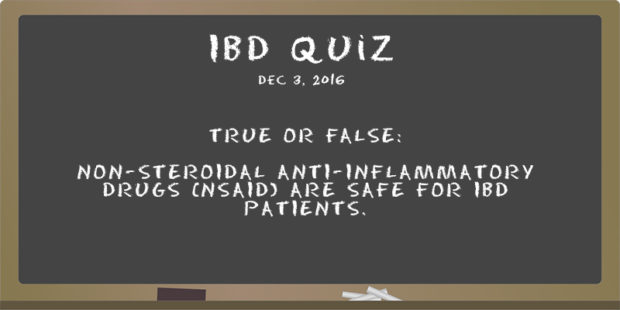
Question #3:
True or False:
Non-steroidal anti-inflammatory drugs (NSAID) are safe for IBD patients.
Submit your answer here: IBD Quiz #3
Time’s up!
Click here to see the correct answer to question #3
If you answered “False”, you are right!
This may have seemed a tricky question, because patients may be receiving different messages from their physicians regarding the safety of non-steroidal anti-inflammatories (NSAID) and IBD.
However, it would not be reasonable to declare NSAIDs as “safe for IBD patients”. NSAIDs, such as ibuprofen, can cause ulceration in the intestines, which breaks the barrier between the gut bacteria and the immune system, which may in turn “activate” the immune system of the gut, leading to a worsening of IBD.
This IBD School video from the University of Michigan IBD center has some good information on this: IBD School 206: What Causes Flares?.
That said, NSAIDs can effect one patient different from the next. For instance, some studies suggest that NSAID use poses more of a risk for Crohn’s disease patients , and there may be less risk with intermittent use in some patients. Because it is not possible to know how it will effect each patient beforehand, the general sentiment regarding NSAIDs and IBD seems to be that avoidance is the safest move.
In her book “IBD Self-Management: The AGA Guide to Crohn’s Disease and Ulcerative Colitis”, Dr. Sunanda Kane warns against the use of NSAIDs with IBD, but does state that “when absolutely needed, like after dental or orthopedic work, conservative use of NSAIDS, with food, for the shortest amount of time is recommended”. This is certainly not saying that NSAIDs are “safe” with IBD; if anything, the takeaway is that if they are going to be used when “absolutely needed”, what qualifies as “absolutely needed” is something to discuss with one’s physician(s).
Amber Tresca of AboutIBD has a nice article on NSAIDs and IBD, “Are NSAIDs Safe For People With IBD?”. In it, she mentions that “people with IBD should consult with their gastroenterologist before taking NSAIDs, even those available over the counter”. This is something you are likely to hear repeated by many IBD specialists. It is, ultimately, the most important thing to remember when it comes to NSAIDs and IBD, so I’m going to repeat it in bold letters for dramatic effect:
People with IBD should consult with their gastroenterologist before taking NSAIDs, even those available over the counter.-Amber Tresca (AboutIBD)
IBD Quiz #4: December 4, 2016
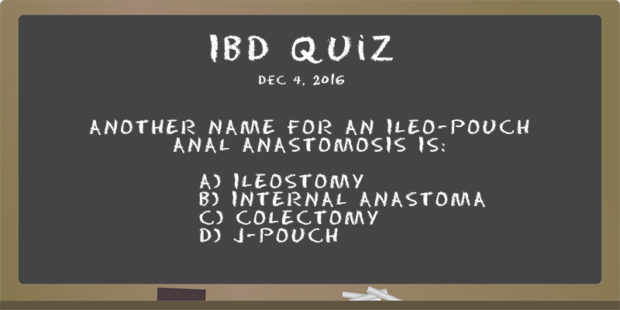
Question #4:
Another name for an ileal pouch anal anastomosis is:
A) ileostomy B) internal anastoma C) colectomy D) j-pouch
Submit your answer here: IBD Quiz #4
Time’s up!
Click here to see the correct answer to question #4
If you answered D) j-pouch, you are right!
The technical name for a j-pouch is an ileal pouch anal anastomosis, or even an ileal j-pouch anal anastomosis. While a j-pouch is the most common kind, there are other shapes of pouches created (such as a w-pouch). For more information on j-pouches, check out this post from Sara Ringer of Inflamed and Untamed, “What Exactly is a J-pouch?”.
As for why the other options are not correct:
An ileostomy is a surgically created opening in which the ileum (the end of the small intestine) is brought out through an opening in the abdomen. A colectomy refers to the surgical removal of the colon. This is a part of the procedures done leading to a j-pouch or an ileostomy in IBD. As for B) internal anastoma, there is no such thing.
IBD Quiz #5: December 5, 2016
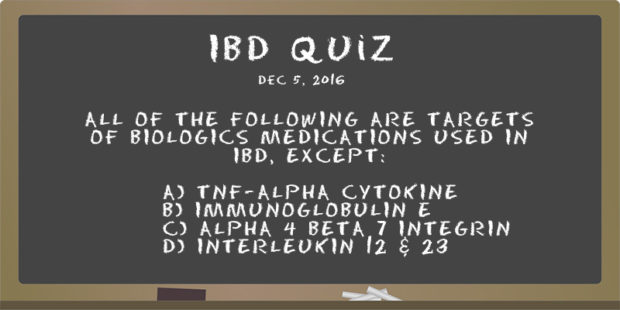
Question #5:
All of the following are targets of biologic medications used in IBD, except:
A) TNF-alpha cytokine B) Immunoglobulin E C) Alpha 4 Beta 7 integrin D) Interleukin 12 & 23
Submit your answer here: IBD Quiz #5
Time’s up!
Click here to see the correct answer to question #5
If you answered “B) Immunoglobulin E” , you are right!
All of the other targets are ones used in biologics that treat IBD. TNF-alpha cytokine is targeted by Infliximab (Remicade), Adalimumab (Humira), Certolozimab pegol (Cimzia), and Golimumab (Simponi). Alpha 4 Beta 7 integrin is the target of Vedolizumab (Entyvio). Interleukin 12 and 23 are targeted by the newest biologic to be FDA-approved in IBD (currently for Crohn’s only), Ustekinumab (Stelara).
Immunoglobulin E is not a target of any biologic treatment for IBD. It is a target associated with allergic conditions. For instance, it is the target of Omalizumab, a biologic used in the treatment of allergic asthma.
IBD Quiz #6: December 6, 2016

Question #6:
True or False: Biological remission is remission achieved with biologic medication.
Submit your answer here: IBD Quiz #6
Time’s up!
Click here to see the correct answer to question #6
If you answered “False” , you are right!
“Biological remission” in IBD typically refers to normalized inflammatory markers in a patient’s lab work. . A very common inflammatory marker associated with biological remission, and probably the one most patients are familiar with as well, is C-reactive protein (CRP), an inflammatory marker in the blood. Another example is fecal calprotectin, an inflammatory marker in stool. Biological markers offer a non-invasive way for physicians to help monitor inflammation levels, determine how well treatments are working, predict disease relapse, and quantify the severity of disease relapses (flare-ups) in patients with IBD. When it comes to remission in IBD, biological remission is just one of the endpoints or goals that an IBD specialist may be looking to achieve with IBD patients.
For more information on CRP, check out this video from the University of Michigan’s IBD Center: “IBD School 501: C-Reactive Protein”. For information on fecal calprotectin, check out “IBD School 503: Fecal Calprotectin”.
IBD Quiz #7: December 6, 2016
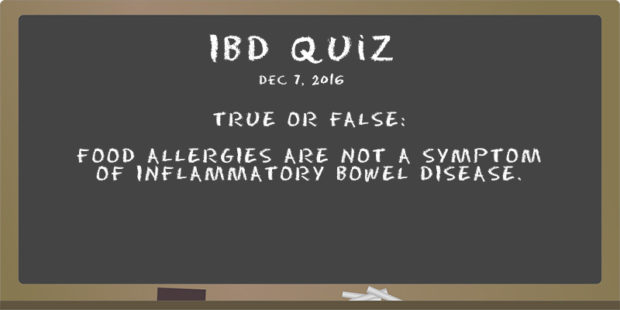
Question #7:
True or False: Food allergies are not a symptom of Inflammatory Bowel Disease.
Submit your answer here: IBD Quiz #7
Time’s up!
Click here to see the correct answer to question #6
If you answered “True” , you are right!
IBD is not caused by food allergies and food allergies are not a symptom of IBD. According to Dr. David Rubin from the University of Chicago IBD center,
“We often hear the term food allergy mentioned. Patients ask, “Am I allergic to certain foods?” IBD is not related to a food allergy, but actually the symptoms of IBD may be worsened by food intolerances. A true allergy to specific foods is actually quite rare, where this is an immune reaction to the food akin to having a histamine release or even anaphylaxis. That is exceptionally rare. But we certainly appreciate that some people are intolerant to certain foods, and specific foods may be things that those individuals should avoid.” Dr. David Rubin
The mistaken belief that IBD is associated with true food allergies can lead some patients to over-restrict their diets. It’s important to work with a good GI and a Registered Dietitian to address any concerns about diet, nutrition, and IBD.
Like this:
Like Loading...











Appreciate your post on this very educational quiz on IBD. Learned much on this and very entertaining as well. Thank you.